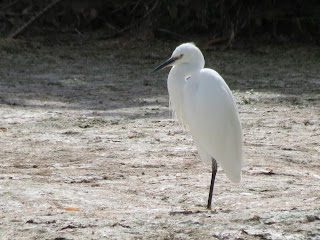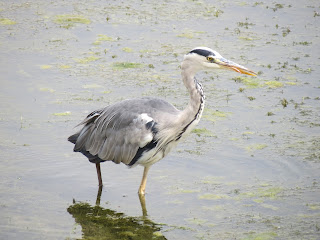TUESDAY 13 AUGUST
Temperatures struggled to reach 17 degrees C
today as a WNW wind blew across the Chilterns Region. There were a few odd
showers, with cloud predominating until clearing late in the
evening.
At TRINGFORD RESERVOIR, a COMMON GREENSHANK
remained for a third day, probing the mud at the far west end (see images), as
did 2 GREEN SANDPIPERS and a COMMON SANDPIPER. All 7 Mute Swans were together,
whilst Tufted Ducks were accompanied by at least 17 young. Before I entered the
woodland, a Common Kestrel flew towards Tringford Farm, and once in the wood, 2
Stock Doves were calling and a party of 4 SPOTTED FLYCATCHERS were feeding in
the canopy. From the hide, 1-2 COMMON KINGFISHERS, 5 Little Egrets, 3 Grey
Herons, 16 Moorhen, 53 Coot and 40 Black-headed Gulls were noted. Butterflies by
the overflow dam included 2 Small Tortoiseshells, 2 Small White and a Small Blue
- the latter a rarity at the reservoirs.
Todays Greenshank - present for a third day
1 of the 2 Green Sandpipers present
A juvenile Grey Heron and several Little Egrets were showing well from the hide
Tufted Ducks and several of the 17 ducklings
A Small Blue butterfly by the dam
Across the road on STARTOP'S END RESERVOIR,
the juvenile DUNLIN was still showing very well along the north shore (for its
7th day); also noted were 2 Mute Swans, 1 Little Egret, 3 Shoveler, 77 Greylag
Geese, 18 Common Terns (8 juveniles) and a Grey Wagtail, whilst on MARSWORTH
RESERVOIR, at least 6 SPOTTED FLYCATCHERS were in the wood and tall Poplars
behind the reedbed, 3 Common Chiffchaff, a migrant juvenile WILLOW WARBLER, Wren
family party, 3 Sand Martin and 8 House Martin.
The 3 eclipse Shovelers on Startop's
The long-staying juvenile Dunlin
An adult Grey Heron stalking prey
Spotted Flycatchers in silhouette - very difficult to photograph in Marsworth Wood
After some sound advice from Tim Watts, I
then travelled over to FULBROOK FARM at the north end of QUAINTON HILLS.
Although it took me a long time, mainly because they were so elusive, I
eventually managed to photograph all four individual birds present in the
hedgerows east of the farm - 3 males and 1 female-type.
For images, see Buckinghamshire Birding blog
COLLEGE LAKE BBOWT was very quiet apart from
a single juvenile Common Redshank so I then headed home to SHARDELOES LAKE. The
cricket pitch held 13 Pied Wagtails (3 family parties), with the Misbourne
alongside two noisy COMMON KINGFISHERS.
All 3 Great Crested Grebe youngsters were
surviving (one of which was now fishing independently) as well as the sole Mute
Swan cygnet. A single SINENSIS CORMORANT was lurking in the shallows with female
Tufted Ducks accompanying 6, 7 and 3 young respectively; just a pair of Gadwall
were seen - and no young. Migrants included 3 Common Chiffchaffs and 2 House
Martins, with a local family party of 5 SPOTTED FLYCATCHERS in the Willows.
Coots numbered 116 and a Grey Wagtail flew over.
(for images, see Birding Amersham blog)
Whilst at Shardeloes, news came via John
Gearing of a RUFF at COLLEGE LAKE BBOWT - the first in the county this year.
Failing to get it properly checked out via the usual channels, I had to race
back there - arriving just after 1640 hours. After a few scans, I quickly
relocated it - a fresh juvenile of the year - feeding in long vegetation on the
spit of the westernmost island. Although very distant from the Information
Centre, I managed a number of record shots presented below. A most satisfying
end to the day. At least 6 more juvenile Common Terns had fledged since my visit
last week, culminating in at least 24 young for the site this year - an
excellent result considering the poor start.



































































No comments:
Post a Comment